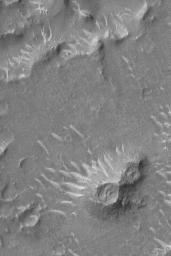Isidis Planitia Features
Caption:
26 June 2004
This Mars Global Surveyor (MGS) Mars Orbiter Camera (MOC) image shows some of the most typical features of Isidis Planitia at full (1.5 meters -- 5 feet -- per pixel) resolution. The typical features are: (1) light-toned, ripple-like dunes and (2) mounds with summit pits. The dunes are formed by wind. The double-cone feature in the lower right quarter of the image is similar to many mounds and chains of mounds or cones found all across Isidis Planitia. These were seen at lower resolution in Viking orbiter images in the 1970s and were generally considered to be either small volcanoes or ice-cored mounds known as
pingoes
. With high resolution MOC images, it became apparent that many of these mounds may simply be the remnants of crater and pit chain floors, elevated above the surrounding plains as the layers of rock into which they formed were stripped away. Like much of Mars, there are more questions than answers. This image is located near 8.6°N, 268.2°W, and covers an area about 1.1 km (0.7 mi) wide. Sunlight illuminates the scene from the left/lower left.
Cataloging Keywords:
| Name |
Value |
Additional Values |
| Target |
Mars |
|
| System |
|
|
| Target Type |
Planet |
|
| Mission |
Mars Global Surveyor (MGS) |
Viking |
| Instrument Host |
Mars Global Surveyor |
|
| Host Type |
Orbiter |
|
| Instrument |
Mars Orbiter Camera (MOC) |
|
| Detector |
|
|
| Extra Keywords |
Crater, Dune, Grayscale, Volcano |
| Acquisition Date |
|
| Release Date |
2004-06-26 |
| Date in Caption |
2004-06-26 |
|
| Image Credit |
NASA/JPL/Malin Space Science Systems |
| Source |
photojournal.jpl.nasa.gov/catalog/PIA06330 |
| Identifier |
PIA06330 |

